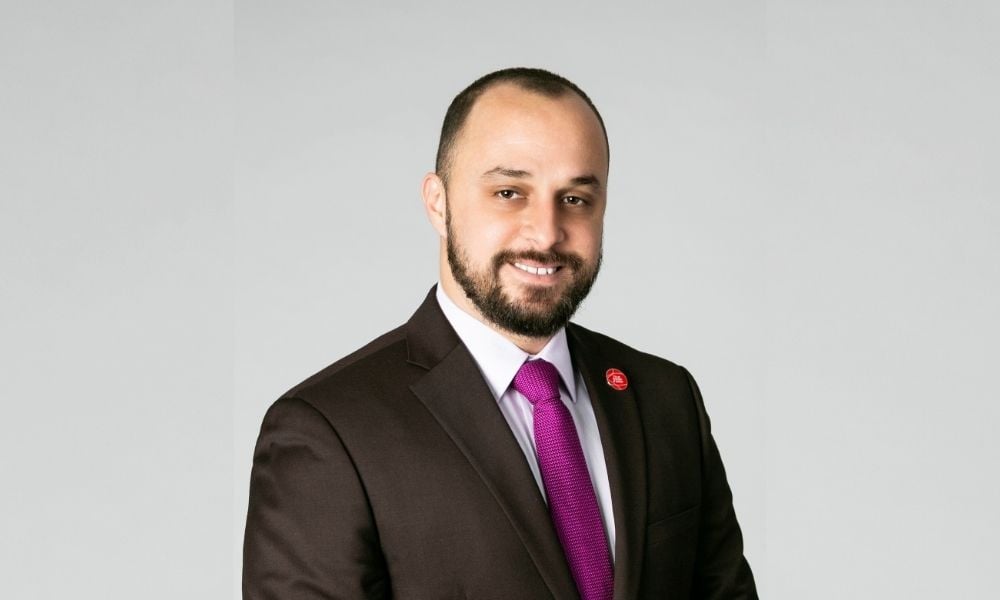Starting his firm during a pandemic, after years of work to get qualified, forced him to be creative

Becoming a lawyer is a long haul, but the obstacles and time involved are often much greater for foreign-trained lawyers.
Antonio Urdaneta specializes in employment and labour-relations law. He began his practice, Workplace Legal, in 2019 and was called to the Ontario bar in 2016.
But his journey to opening his firm in Canada involved many more years in the legal profession.
Urdaneta was born and raised in Venezuela but moved to Canada in 2010. His mother, who raised him and his sister as a single mother, is also a lawyer in Venezuela. Like Urdaneta, his sister followed their mother’s footsteps and earned a law degree from the La Universidad del Zulia.
“I remember walking when I was probably 8-10 years old, walking these hallways [at Universidad del Zulia’s law school] with my mother, and she was holding my hand… It's funny to contrast the size of those hallways when you're eight years old and then when you're older, a young adult, going to law school.”
After graduating, Urdaneta worked for a few judges as a law clerk at Venezuela's specialized employment and labour courts. He had visited his great aunt in Toronto several times as a child, though, so he was familiar with Canada.
In Venezuela, Urdaneta lived in a house with bars in his windows. He didn't feel safe going out and enjoying the city and the parks.
Canada seemed like a more peaceful place where he could walk the streets, so he decided to move closer to his great aunt. She now lives two blocks away from him.
Urdaneta originally moved to Montreal and lived there for a year. He then moved to Toronto to be closer to his great aunt and to enrol in the “Internationally Trained Lawyers Program” at the University of Toronto. The ITLP was a unique program in Canada, and Urdaneta earned a certificate there.
In addition to the ITLP certificate, Urdaneta earned degrees from the University of Toronto, including a master’s degree in business law. It took him about four years to finish all his qualifications and certification assessments and become licensed.
Urdaneta also had non-legal jobs to pay his way through school, and his great aunt provided a home and food for him to become established. He also did volunteer work for the Human Rights Legal Support Centre.
Reflecting on the many years that it took him to become licensed, Urdaneta says there is a big gap in Canada between the experiences and knowledge of internationally trained professionals and the needs of the Canadian economy.
Once he was licensed, Urdaneta worked for Guillermo Schible, a commercial litigator he met through the Canadian Hispanic Bar Association. Urdaneta was later elected president of the CHBA (his term ended in June 2021).
Although he had a chance to appear in court and get Canadian experience at Schible’s firm, Urdaneta wanted to continue to practise in his area of expertise, employment relations. That meant launching his own law firm.
Opening his practice meant he had to overcome a lot of fear, and he worked with coaches that he found through the Law Society of Ontario.
He had to determine the corporate structure of his firm, where his first clients would come from, and cash flow.
Urdaneta said he had many other questions, such as “Am I ready for this? English is my second language. So how would I perform with clients, with courts and things like that?”
But he finally took the plunge and opened his practice in May 2019. But a few months later, the pandemic hit.
For networking, Urdaneta’s options for in-person events were severely limited or non-existent during lockdowns. So, he decided to join business networks with virtual events.
These events were helpful to expand his network quickly, but deeper connections were a real challenge, he says. So, he started a podcast called “Great Professionals Hablan Español” (translated to “Great professionals speak Spanish”).
His podcast records Spanish-speaking professionals worldwide speaking about topics such as human resources.
“That has given me deep connections with great professionals across the world.”
Urdaneta now has a wide range of clients, including small and midsize business owners, many of whom are in the regulated professional environment like dentists, optometrists and architects.
In addition to advising his clients on employment law, Urdaneta conducts workplace investigations into allegations of violence, harassment including sexual harassment, and discrimination.
Urdaneta is particularly passionate about that work.
“A big part of healthy workplaces is [when] employers, employees, human resource professionals, lawyers and so on [focus] on understanding harassment.”
He is also passionate about his clients, many of whom own small businesses.
“Smaller employers, if you put them together, they have tonnes of employees, even more than larger corporations together… The small business communities in general, it's not a matter of ill intent, but it's more a matter of not having the right tools and the right information to make quick decisions.”
He prepares short videos for clients that work them through the documents he is giving them.
“It's not just, here's the contract, your template and here are your policies. It's more than that. It involves following up with them.”
Urdaneta’s long journey to becoming a lawyer in Canada is finally bearing fruit.










